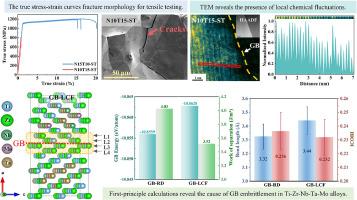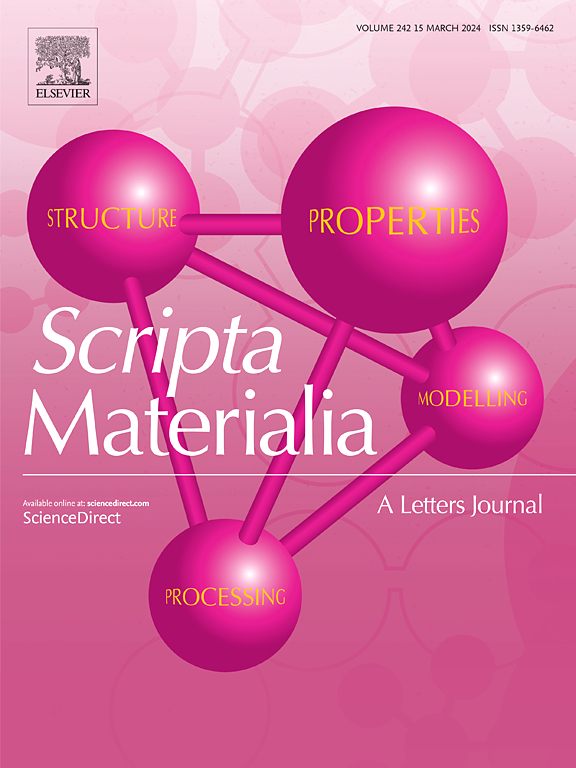钛-锆-铌-钽-钼多主元难熔合金中局部化学波动与晶界强度之间的相关性
IF 5.6
2区 材料科学
Q2 MATERIALS SCIENCE, MULTIDISCIPLINARY
引用次数: 0
摘要
钛-锆-铌-钽-钼难熔多元素合金通常具有较高的屈服强度,而拉伸延展性往往较差。在这项研究中,我们发现即使在对 Ti-Zr-Nb-Ta-Mo 合金进行固溶处理后,由于局部化学波动,延展性也会发生显著变化。钽的剧烈化学波动会引起原子尺度应变场的变化,导致晶界强度降低和脆性断裂。第一性原理计算表明,晶界富含(Ti、Zr)会增加价电子的析出,导致键长变长和晶体轨道键指数值降低,从而引起晶界脆化。我们的研究结果从原子和电子尺度探讨了 Ti-Zr-Nb-Ta-Mo 合金脆性的根本原因,不仅提供了一种利用键长、电子局域化函数和晶体轨道键指数分析晶界脆性的方法,还为通过优化晶界结构改善机械性能提供了理论指导。本文章由计算机程序翻译,如有差异,请以英文原文为准。

Correlations between local chemical fluctuations and grain boundary strength in Ti-Zr-Nb-Ta-Mo refractory multi-principal element alloys
Ti-Zr-Nb-Ta-Mo refractory multi-principal element alloys typically exhibit high yield strength while tensile ductility tends to be poor. In this study, we found that even after solid solution treatment of Ti-Zr-Nb-Ta-Mo alloys, significant change in ductility occur due to the local chemical fluctuations. Ta's dramatic chemical fluctuations cause variations in atomic-scale strain fields, leading to reduced grain boundary strength and brittle fracture. First-principles calculations show that (Ti, Zr)-rich at the grain boundaries increases the delocalization of valence electrons, leading to longer bond lengths and reduced crystal orbital bond index values, thereby causing grain boundary embrittlement. Our findings explore the root causes of brittleness in Ti-Zr-Nb-Ta-Mo alloys at the atomic and electronic scales, providing not only a method to analyze grain boundary embrittlement using bond length, electronic localization function and crystal orbital bond index, but also a theoretical guidance for improving the mechanical properties via grain boundary structure optimization.
求助全文
通过发布文献求助,成功后即可免费获取论文全文。
去求助
来源期刊

Scripta Materialia
工程技术-材料科学:综合
CiteScore
11.40
自引率
5.00%
发文量
581
审稿时长
34 days
期刊介绍:
Scripta Materialia is a LETTERS journal of Acta Materialia, providing a forum for the rapid publication of short communications on the relationship between the structure and the properties of inorganic materials. The emphasis is on originality rather than incremental research. Short reports on the development of materials with novel or substantially improved properties are also welcomed. Emphasis is on either the functional or mechanical behavior of metals, ceramics and semiconductors at all length scales.
 求助内容:
求助内容: 应助结果提醒方式:
应助结果提醒方式:


